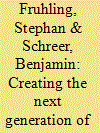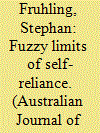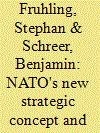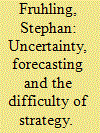| Srl | Item |
| 1 |
ID:
067383


|
|
|
| 2 |
ID:
094064


|
|
|
|
|
| Publication |
2010.
|
| Summary/Abstract |
NATO has a panoply of legacy partnership programmes, which should be reviewed as part of the development of a new Strategic Concept. Stephan Fruhling and Benjamin Schreer argue that NATO should conceive of its partnerships in terms of the provision of public security goods, and base its activities on a more explicit consideration of the Alliance's strategic interests. In combination, both aspects can achieve consensus about goals and means, provide greater coherence, and better communicate NATO's activities and intentions.
|
|
|
|
|
|
|
|
|
|
|
|
|
|
|
|
| 3 |
ID:
119066


|
|
|
|
|
| Publication |
2013.
|
| Summary/Abstract |
As a close US ally, Australia is often seen as a recipient of US extended deterrence. This article argues that in recent decades, Australian strategic policy engaged with US extended deterrence at three different levels: locally, Australia eschews US combat support and deterrence under the policy of self-reliance; regionally, it supports US extended deterrence in Asia; globally, it relies on the US alliance against nuclear threats to Australia. The article argues that in none of these policy areas does the Australian posture conform to a situation of extended deterrence proper. Moreover, when the 2009 White Paper combines all three policies in relation to major power threats against Australia, serious inconsistencies result in Australia's strategic posture-a situation the government should seek to avoid in the White Paper being drafted at the time of writing.
|
|
|
|
|
|
|
|
|
|
|
|
|
|
|
|
| 4 |
ID:
145266


|
|
|
|
|
| Summary/Abstract |
Missile defence plays an increasing role in NATO and in most US alliances in Asia, which raises the question of what impact it has on the management of extended deterrence. Extended deterrence relies on the threat of escalation. Since the costs of escalation are different for different allies, the management of extended deterrence is inherently difficult. Missile defence shifts the relative costs of conflict, and therefore also impacts on the alliance bargains that underpin agreement on extended deterrence strategy. Although increased defensive capacity is a clear net benefit, the strategic effects of its deployment and use can still be complex if, for example, missile defence increases the chances of localizing a conflict. The article discusses the role of missile defences for the US homeland, and of the territory and population of US allies, for extended deterrence credibility and the reassurance of US allies in Asia and in NATO. It argues that there is increased scope in strengthening deterrence by enmeshing the defence of the US homeland with that of its allies, and that allies need to pay closer attention to the way the deployment and use of missile defence influence pressures for escalation. In general, missile defence thus reinforces the need for the United States and its allies in Europe and Asia to negotiate an overall alliance strategy.
|
|
|
|
|
|
|
|
|
|
|
|
|
|
|
|
| 5 |
ID:
093085


|
|
|
|
|
| Publication |
2009.
|
| Summary/Abstract |
The rise of China poses a great challenge for the transatlantic alliance. Although the common values that bind Europe and North America will not vanish, increasing demands on US resources from the Asia-Pacific region will erode the pre-eminence of the Atlantic alliance in American security policy. NATO must therefore adapt to the new reality by acknowledging the global nature of US commitments in its new Strategic Concept - and European powers must have a debate about the implications of East Asia for their own security.
|
|
|
|
|
|
|
|
|
|
|
|
|
|
|
|
| 6 |
ID:
096899


|
|
|
|
|
| Publication |
2010.
|
| Summary/Abstract |
Australia's decision to sign the Nuclear Nonproliferation Treaty and forego the acquisition of nuclear weapons was taken on medium-term strategic grounds. While similar circumstances prevail today, it is possible to identify three conditions for the acquisition of nuclear weapons by Australia to be a credible option: the existence of a major threat to Australia; a loss of confidence in US guarantees; and allied acquiescence to an Australian nuclear program. These conditions interact with Australia's relationship with Indonesia and the technological and industrial feasibility of "tactical" and "strategic" nuclear weapons postures, respectively. The only Australian nuclear posture that does not lack credibility in light of all these factors is the use of "tactical" weapons to deter major landings on the Australian mainland.
|
|
|
|
|
|
|
|
|
|
|
|
|
|
|
|
| 7 |
ID:
070622


|
|
|